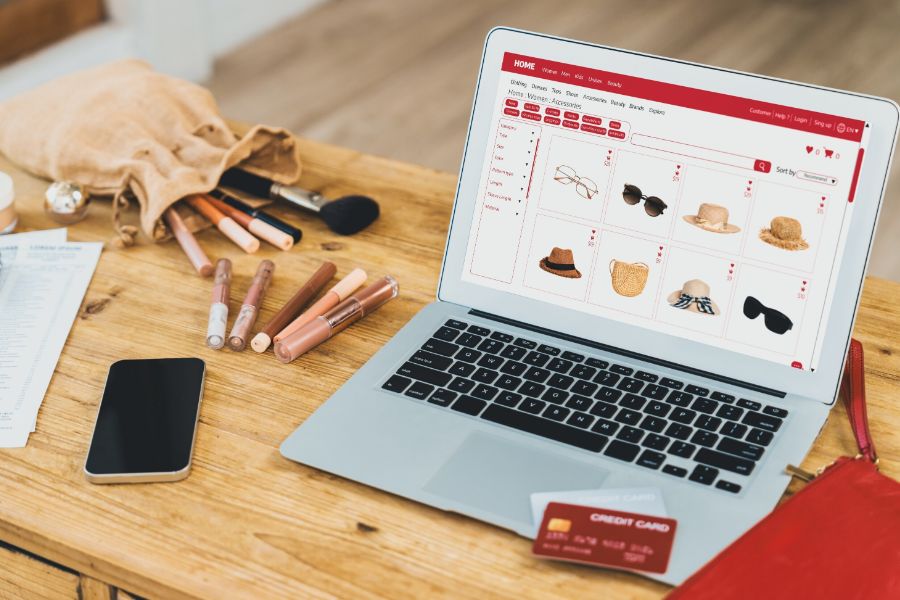In today’s dynamic business landscape, managing e commerce multi store poses unique challenges. However, the emergence of innovative solutions has paved the way for a more streamlined approach. This article delves into the complexities of managing e-commerce multi-store and unveils the advantages of using a unified platform. Discover how this strategy enhances operational efficiency, improves customer experiences, and simplifies the intricate task of multi-store management.
The Struggles Of Managing An E Commerce Multi Store
By 2022, global retail e-commerce sales were projected to surpass 5.7 trillion U.S. dollars, and this number is anticipated to scale even greater heights in the foreseeable future. Given this exponential growth, managing an e-commerce multi-store setup within a unified platform becomes increasingly crucial. This involves several key steps to ensure streamlined operations and optimal results. Here are some of the most common difficulties inmanage multiple online stores:
Data Management
As of 2018, over half of the participants indicated a strong consensus by stating “completely agree” regarding the significance of data for their organization’s strategy. While data management on a single site is substantial, extending it to multiple sites can rapidly become an overwhelming task.
- The need to navigate between sites for updates on each product introduces time constraints and risks. As businesses deal with multiple inventories, databases, and ordering systems, often a common scenario, the complexity of workflows escalates.
- The task of gathering and analyzing data from each store presents another hurdle in the e commerce multi store. Each customer interaction holds valuable insights into preferences, behaviors, and needs. In the absence of effective data collection and analysis solutions, significant information can remain unnoticed, causing businesses to overlook crucial insights.
Multiple Brands
- When large enterprises manage multiple brand names and necessitate distinct stores for each brand, achieving a solution that balances separation and unity can be intricate.
- Companies might allocate unnecessary resources due to a lack of awareness that consolidating separate brands onto a single platform can streamline crucial internal processes.
Different Brand Messaging
Consider a vendor with an e commerce multi store featuring akin brands; brand managers must strategically design and execute approaches for each store, channel, and device.
- The objective often revolves around maintaining brand uniformity while also addressing diverse audience needs and delivering personalized content to individual customers.
- This becomes a challenge when businesses operate multiple stores through isolated solutions, making it demanding to uphold a singular information source while managing specific strategic adaptations.
Multiple Customer Types, like B2B vs. B2C
For businesses serving both B2B and B2C clientele, separate stores are frequently necessary to cater to distinct user experiences and payment methods.
- Product details, pricing, availability, terms, and more can substantially differ between offerings for B2B and B2C customers.
- Managing varying buyer lifecycles and purchasing experiences further complicates matters.
Varying Regional Requirements
- International e commerce multi store mandates support for multiple languages, currencies, payment providers, VAT/sales tax, shipping methods, and varied cultural expectations.
- Navigating these diverse regional requirements while maintaining consistent branding can lead to challenges for companies.
Increase in Customer Service Needs
Thriving in an e-commerce multi-store necessitates top-tier customer service across multiple locations.
- Customers expect access to their order histories, seamless reordering of preferred products, efficient processing of returns or exchanges, and prompt responses to inquiries.
- Providing exceptional customer service is already demanding for a single store; this challenge amplifies when dealing with multiple stores and diverse customer needs.
How To Manage E Commerce Multi Store In One Unified Platform
Managing an e commerce multi store setup within a unified platform involves several key steps to ensure streamlined operations and optimal results. Here’s a comprehensive guide on how to effectively manage multiple online stores under one unified platform:
Streamline Your Technology Stack with a Unified Login
- Managing multiple online stores often involves juggling various software applications, each catering to different aspects such as inventory management, order processing, and customer support.
- A unified platform allows you to consolidate these functions into a single dashboard, simplifying your tech stack and reducing complexity. With just one login, you can gain access to all the tools you need to run your e commerce multi store business efficiently.
Centralize the Connection and Management of Multiple Brands and Their Data
Effectively managing a portfolio of multiple brands or stores demands adept coordination to uphold consistency and optimize resource allocation.
- By integrating a centralized hub, you effortlessly connect and oversee all your brands from a single location, ensuring a seamless brand experience across diverse channels.
- This centralized approach encourages enhanced team collaboration and streamlines decision-making, resulting in a comprehensive understanding of your entire e commerce ecosystem.
These capabilities are exemplified by ConnectPOS, which features an innovative centralized data management system.

Observe Your Customer’s Desires
Understanding your customer’s preferences is crucial for ecommerce success.
- A unified platform enables you to gather and analyze customer data across all your stores.
- By consolidating these insights, you gain a holistic understanding of their behaviors, allowing you to tailor marketing strategies, personalize offerings, and enhance the shopping experience.
Connect As Many Stores on The Same Platform
Tap into the exceptional benefit of a unified platform: its effortless scalability. This allows you to seamlessly incorporate and oversee multiple stores within the same framework, regardless of their scale or geographical dispersion.
- This scalable model empowers you to broaden your ecommerce horizons without the complexity of managing distinct systems for each store. This convenience holds true whether you’re running a small business or a sprawling enterprise.
- The proficiency in managing multi-store setups is seamlessly integrated within ConnectPOS, enhancing your management prowess to a new level.
The Best Platform To Manage E Commerce Multi Store – ConnectPOS
When it comes to efficiently managing an e commerce multi store setup, ConnectPOS stands out as one of the best platforms available. This point-of-sale (POS) solution offers a suite of features designed to address the unique challenges that arise when overseeing multiple online stores. Here’s why ConnectPOS is the optimal choice for managing your e commerce multi store venture:
- Centralized Hub: ConnectPOS provides a centralized hub that allows you to seamlessly connect and oversee all your stores from a single location. This streamlines operations, enabling you to manage inventory, orders, and customer data across all stores efficiently.
- Centralized Data Management: ConnectPOS offers a centralized data management feature that consolidates essential data, including sales, inventory, and customer behaviors, into a unified platform. This empowers you with real-time insights across all stores, aiding in informed decision-making and identifying trends swiftly.
- Real-time Inventory Insights: With ConnectPOS, you gain real-time inventory visibility across all your stores. This prevents overstocking and stockouts, ensuring products are available when and where needed.
- Unified Checkout Process: ConnectPOS enables a unified checkout process, simplifying the customer experience. Shoppers can make purchases from multiple stores using a single transaction, enhancing convenience and encouraging repeat business.
- Personalized Customer Engagement: Leverage ConnectPOS’s data insights to create personalized marketing campaigns. Tailor promotions and recommendations based on customer behavior, enhancing engagement and driving conversions.
- Scalability: ConnectPOS is scalable, accommodating the growth of your multi-store business. Whether you’re expanding to new markets or adding more stores, ConnectPOS provides the flexibility to adapt to your evolving needs.
- Ease of Use: This POS offers an intuitive user interface that simplifies the management of multiple stores. Its user-friendly design ensures that your team can quickly navigate and make the most of its features.
- Enhanced Team Collaboration: With ConnectPOS, your teams can collaborate seamlessly. It facilitates communication, enabling efficient coordination among different departments across all your stores.
- Security and Compliance: ConnectPOS prioritizes security and compliance, safeguarding customer data, and adhering to industry regulations. This ensures your business remains trustworthy and compliant.
- Customer Support: The system provides dedicated customer support to address any issues or queries promptly, ensuring a smooth experience as you manage your multi-store setup.
Overall, ConnectPOS offers an all-encompassing solution to the complexities of managing an e commerce multi store setup. Its centralized hub, data management capabilities, scalability, and focus on enhancing the customer experience make it the ideal platform for efficiently overseeing and growing multiple online stores.
E Commerce Multi Store FAQs
Here’s a set of frequently asked questions (FAQ) related to ecommerce multi-store management
What Is the Best E Commerce Multi Store Solution?
The best e-commerce multi-store solution should offer a centralized platform that allows you to manage and oversee multiple online stores efficiently. It should have features like unified inventory management, centralized data analytics, and a seamless checkout process across all stores. ConnectPOS is a notable example of a comprehensive solution that addresses the complexities of managing multiple stores within a unified framework.
Can I Use One Marketing Tool for E-Commerce Multi-Store?
Yes, using one marketing tool for e commerce multi store is possible and can be highly beneficial. A unified marketing automation tool can help streamline your marketing efforts across all your stores. By leveraging customer data from various stores, you can create personalized marketing campaigns that resonate with your diverse customer base. This approach ensures consistent branding and messaging while optimizing your marketing strategy.
What Is the Best Marketing Tool for E-Commerce Multi-Store?
The best marketing tool for an e commerce multi store should be capable of managing campaigns across multiple stores while offering personalization options. HubSpot, for instance, is a popular marketing automation tool that allows you to create, manage, and analyze marketing campaigns for all your stores from a single dashboard. It offers segmentation, email marketing, social media management, and analytics to optimize your marketing efforts.
Conclusion
Businesses can unlock the potential for growth, scalability, and enhanced customer satisfaction by addressing the struggles associated with multi-store operations. Solutions like ConnectPOS are reliable tools, offering a centralized hub and advanced features to streamline operations. With the right strategy and technology, navigating the intricacies of multi-store eCommerce becomes a journey of efficiency and success. Feel free to get in touch with us for any consultation regarding ConnectPOS.



